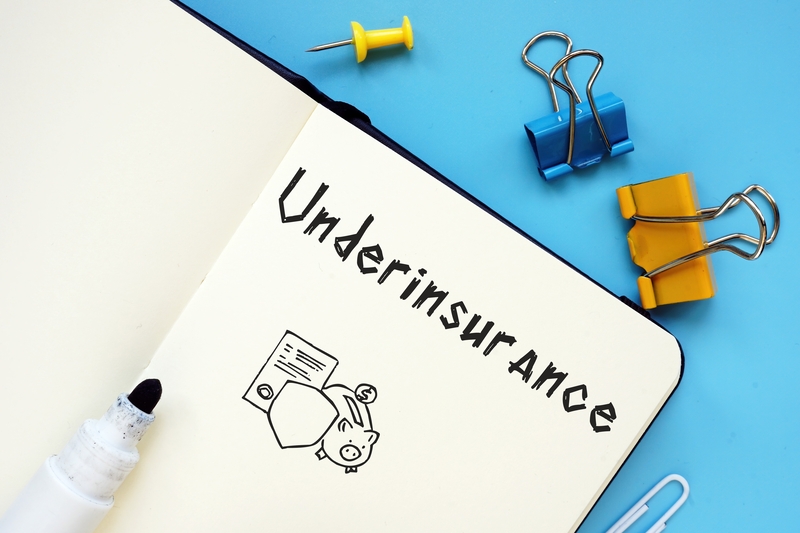We recently published an essential introduction to business interruption insurance. We explored what a business insurance policy covers, and what it does not cover. In this post, we’ll discuss some vital steps you can take to ensure your business interruption insurance gives you the cover you need, when you need it.
Why is Underinsurance a Serious Issue?
According to the Chartered Institute of Loss Adjusters, 40% of businesses with business interruption policies are underinsured. This means that if they ever face an unexpected event, their policy will not stretch to cover all their expenses. There are many examples of this and most recently a landmark case called Infinity Reliance has again brought this to the fore.
In May 2021, a business’s premises were destroyed by fire. The business lost millions in revenue before they could find alternative premises. Yet due to certain aspects of their business interruption insurance policy, the business was underinsured by £2.9m.
Business Interruption Insurance can be complicated but as a buyer your mindset should be a conscious need to protect your business in full. There are things that you can do which we detail below and things that your broker can do to help ensure the correct buying decision.
How to Avoid Underinsurance
Here are some tips to help you avoid such a situation through ensuring you have the right level of business interruption insurance in place. Remember that you may find fellow directors of a business will also be relying on the correct cover being in place:
Prepare For The Long-Term: Recovery May Take Longer Than You Think
We always advise clients that recovery from a major loss will likely take much longer than you think.
According to various sources, around 70% of businesses that get business interruption insurance only get enough cover to last for 12 months following a loss. Our professional advice is to purchase a minimum of 24 months.
Consider Your Additional Costs of Working
For protection you can depend on, make sure your business interruption insurance covers “Additional Costs of Working” expenses.
This will be particularly important if you need to relocate to temporary premises while your main business premises are renovated or repaired. As well as rent and relocation costs, you may also have to account for hiring equipment, staff overtime and bonuses, and extra travel costs.
Unless your policy includes cover for “Additional Costs of Working”, your insurer may dispute these expenses should you ever need to make a claim.
Insure As Much of Your Gross Profit as Possible
Gross Profit is the sum total of your turnover, your closing stock, and your closing work in progress, minus the combined sum of your opening stock, your opening work in progress, and your uninsured working expenses.
Uninsured working expenses can include purchases, packaging, transport costs, and bad debts.
For your business interruption insurance, it’s vital that you insure as much as your gross profit as possible. Trust us: You’ll need it.
This is where your broker can help you.
Check Your Business Interruption Insurance Policy Wording
Some insurers refer to uninsured working expenses as “variable expenses”. Usually, these are defined as “expenses that would reduce, or disappear entirely, in the event of business interruption.”
With such a policy wording, it’s unlikely that your business insurance will cover you for all the expenses you’ll incur during your downtime. So to ensure you have all the cover you need, make sure your policy wording uses the term “uninsured working expenses” instead of “variable expenses”.
Understand The Difference Between Indemnity Wording and a Declaration Linked Wording
A declaration linked business insurance policy can help you overcome any issues you might have with forecasting your business’s future profits.
Essentially, this means that at the start of each policy year, and whenever you renew your policy, you submit a declaration showing your estimated gross profit based on your most recent financial year. The premium you pay is based on this estimate. If you estimate too much, or too little, your premium may be adjusted accordingly.
Usually, a declaration linked policy will cover you for your estimated gross profit plus an additional 33%, just in case your estimate was too low.
These kinds of wordings are usually placed for larger buyers of insurance who are used to premium adjustments due to declaring actual figures. It can be frustrating to be charged an additional premium by an insurer for an event that hasn’t happened but remember you are more likely to be fully indemnified with this type of protection.
Avoid Indemnity Wording Policies
Most smaller insurance buyers will insure business interruption on an indemnity basis. It’s common for insurers to only offer declaration linked policies to mid- to large-scale businesses. This sort of policy might not be available to SMEs.
It is important to understand that adequate protection is very much subject to the buyer accurately stating the revenue they need to protect.
An indemnity wording on your policy will also include an underinsurance average clause. Let’s say you miscalculate your gross profits when taking out a policy, which means your insurer charges you a lower premium. If you face a loss and make a claim on your policy, your insurer has the right to reduce your settlement in proportion to your premium underpayment. Obviously, this would severely jeopardise your business’s chances of recovering from the loss.
With an indemnity wording you will not get that 33% automatic buffer to cover you for business interruption.
Are You Worried About Business Interruption Insurance and Underinsurance?
As trusted and experienced insurance brokers, we can help you get a business interruption insurance policy that truly meets your needs. Find out more about our business interruption insurance policies.
We have a team of experts on hand who can advise on your insurance needs. They can also help you to understand the risks that you may face as a business. Contact us on 020 8290 9080 or email business@anthonyjones.com.


